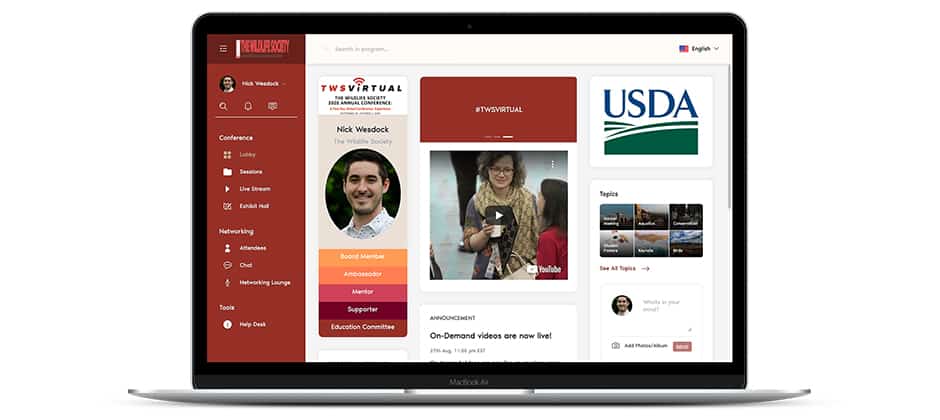Share this article
What’s happing Friday at TWS’ virtual conference
The last day of The Wildlife Society’s Virtual Conference brings a long list of workshops for attendees, as well as symposium panels and office hours. The times for the workshops below are EDT, but attendees will see the times in their own time zones on the conference platform.
9 a.m. EDT Workshops
Introduction to Google Earth Engine for Wildlife Biologists:
Google Earth Engine is a powerful, free online platform that has revolutionized the way that the scientific community uses geospatial data. It can be used to conduct traditional GIS analyses, process and manipulate remote sensing imagery and build web applications to showcase results or let the public run complex analyses. The goal of this introductory session is to familiarize wildlife professionals with the capabilities and functionality of the platform. The morning workshop is the precursor to a more advanced afternoon workshop. Supported by: Spatial Ecology and Telemetry Working Group.
10 a.m. EDT Workshops
Introduction to Viewing and Interpreting Bat Acoustic Data: This workshop is targeted toward graduate students, environmental consultants and agency biologists that encounter acoustic survey data on a regular basis but have limited formal training or experience. Western EcoSystems Technology, Inc.
Multi-Species Occupancy Modeling: This workshop will introduce users to multi-species occupancy models, discussing basic sample design issues, and identify how to properly format data for analyses. Participants will then proceed by fitting simple multi-species models, and continue to add complexity throughout. Supported by: Biometrics Working Group.
Fundamentals of Structured Decision Making: This workshop will outline the fundamentals of decision analysis, with an emphasis on participatory discussion and hands-on exercises. Instructors will share insights from real-world applications. Registration fee includes a copy of the new book, Structured Decision Making: Case Studies in Natural Resource Management. Supported by: Biometrics Working Group, USGS Patuxent Wildlife Research Center, USFWS National Conservation Training Center.
Introduction to Continuous-Time Movement Modeling for Animal Tracking Data: This workshop will provide beginners with an introduction to important concepts, as well as hands-on experience using point-and-click software (ctmmweb) and the R command line (ctmm), to apply advanced statistical methods to tracking data. Geospatial Analysis in R: This workshop will give participants the tools to do their geospatial workflow entirely within R. It will include a number of hands-on exercises and tips on cartography and creating high-impact maps in R. The workshop is targeted to a broad audience, but some familiarity with GIS software is expected. Supported by: Roosevelt Wild Life Station, SUNY-ESF.
1 p.m. EDT Workshops
eBird Status and Trends: Working with Modeled Products in R: The citizen science project eBird has generated a database of over 750 million bird observations, resulting in high resolution, weekly data. This workshop will introduce attendees to the modeled data products (weekly estimates of range boundaries, occurrence rate, and relative abundance) and the R package developed specifically for working with these data. Some experience with R will be helpful in following along with the demonstration. Supported by: Biometrics Working Group.
Designing Wildlife Courses to Achieve Desired Competencies: This workshop will introduce participants to research-supported approaches in course design. Participants will work through exercises intended to convey what we know about how effective learning occurs, how to identify and create course learning objectives, how to use backward design to focus learning on these objectives, and how to use specific teaching techniques to create significant learning experiences. This workshop is intended for existing instructors and graduate students interested in teaching. Participants should bring a laptop and an example syllabus or course outline for use in workshop activities. Supported by: College and University Education Working Group.
Small Scale – Big Results: The Impact of Urban Restoration and How to Inspire Others: This workshop will showcase successful urban restoration projects throughout the United States, identify challenges and how they were overcome, identify how momentum was built and sustained, and highlight the natural resource and cultural impacts of these restoration projects on their communities. Workshop attendees will be given the tools necessary to affect change and help sustain broader urban habitat restoration in their communities. Supported by: Urban Wildlife Working Group.
Optimizing Landscape Resistance Surfaces Using ResistanceGA: This half day workshop will provide a brief overview of landscape resistance modeling in the context of landscape genetics, followed by detailed coverage of how to use ResistanceGA to optimize landscape resistance surfaces. Workshop attendees will get extensive hands-on experience using ResistanceGA functions, conducting analyses, and interpreting results. To get the most out of this workshop, attendees should have a working knowledge of R. Supported by: Molecular Ecology Working Group.
How to Speak (And Understand) Forestry for Wildlife Biologists: The goal of this session is to introduce basic forestry principles, clarify terminology and forestry objectives, and better understand how to integrate forestry and wildlife conservation objectives. The session will be informal and encourage interaction and questions from workshop participants. Supported by: Biological Diversity Working Group, Sustainable Forestry Initiative (SFI), Cafferata Consulting, LLC, Forestry and Wildlife Working Group (proposed).
2 p.m. EDT Workshops
Advanced Google Earth Engine for Wildlife Biologists: The goal of this session is to enable wildlife professionals who are already familiar with the capabilities and functionality of the platform to perform more complex analyses and data presentations. This afternoon workshop is the follow-up to an introductory morning workshop. Supported by: Spatial Ecology and Telemetry Working Group.
Header Image: The last day of the conference is filled with workshops. Credit: TWS








